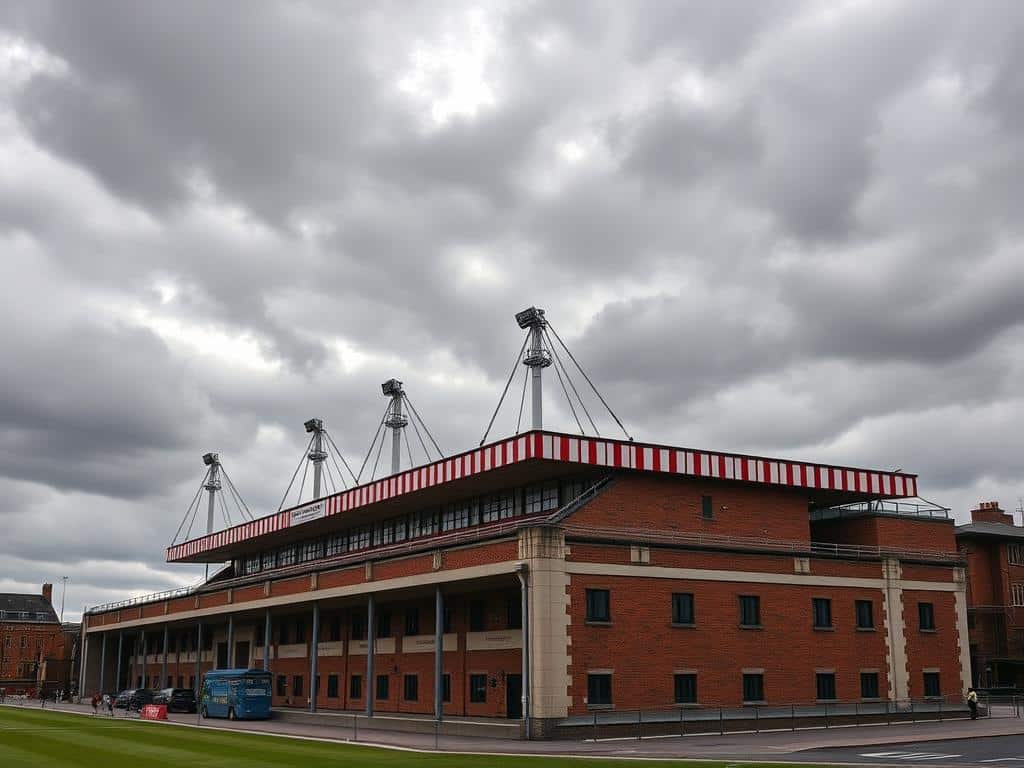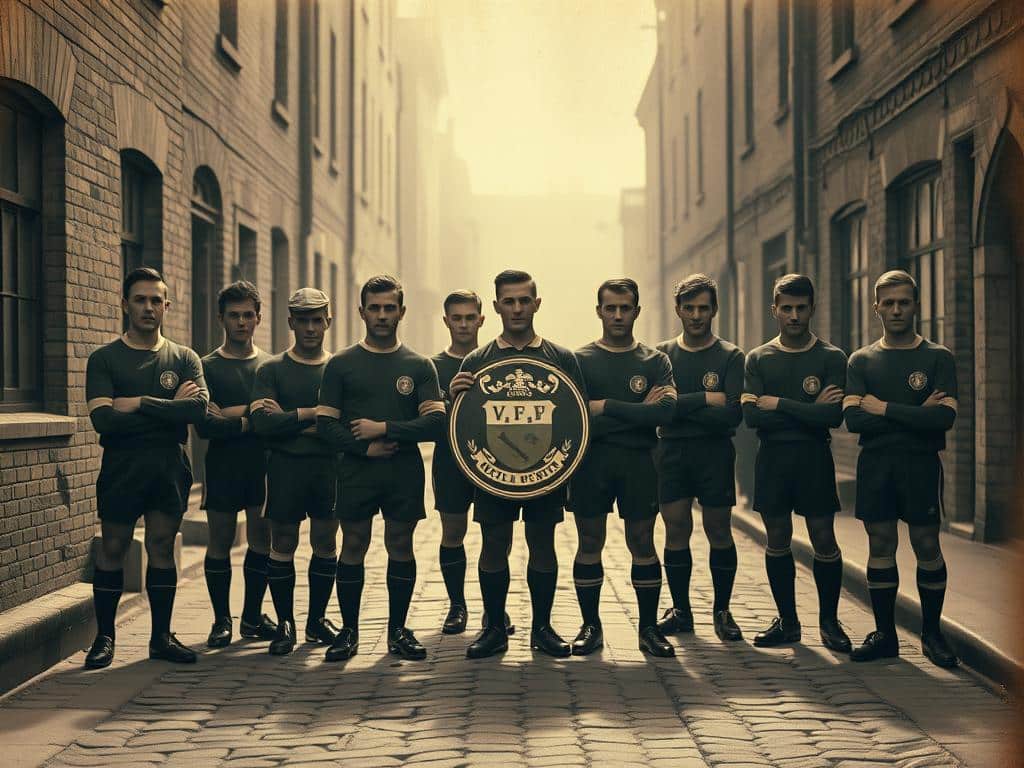Did you know the oldest football club in the world was founded in 1857? That’s right—Sheffield FC has been around for over 160 years, shaping the game we love today. These teams aren’t just part of history; they’re the foundation of modern football.
From Nottingham Forest to Sheffield FC, these clubs have left a lasting legacy. Their stories are filled with passion, rivalry, and innovation. Understanding their journey helps us appreciate how far the sport has come.
This article dives into the roots of English football, exploring the teams that started it all. Whether you’re a new fan or a seasoned enthusiast, you’ll find their history both fascinating and inspiring. Let’s kick off this journey together!
Foundations of English Football: Birth of the Clubs
The roots of modern football trace back to the mid-19th century. During this time, societal changes in England played a huge role in shaping the sport. The Industrial Revolution brought people together in urban areas, creating a sense of community. This environment was perfect for the rise of local teams and organized play.
Historical Context and Societal Influences
In the 1800s, football was mostly an informal activity. Schools and factories often had their own versions of the game. As the sport grew in popularity, it became clear that rules were needed. This led to the formation of the Football Association in 1863, a pivotal moment in football history.
Working-class communities embraced the sport, forming their own clubs. These teams became a source of pride and identity. The FA Cup, launched in 1871, gave these clubs a chance to compete on a larger stage. It was a game-changer for the sport.
The Emergence of Organized Matches and Competitions
By the 1880s, football had evolved from casual play to structured competitions. The Football League, established in 1888, was the first of its kind. It brought together the best teams to compete in a formal league system.
This era also saw innovations like the rubber bladder ball, which improved gameplay. The 2-3-5 formation became popular, adding strategy to matches. These developments laid the foundation for the modern football league system we know today.
From humble beginnings to organized leagues, the birth of football clubs marked the start of a global phenomenon. Their legacy continues to inspire fans and players worldwide.
Key Characteristics of Early Soccer Clubs in England
Football’s early days were marked by innovation and community spirit. These teams weren’t just about playing the sport; they were about building connections and creating something new. Their unique traits set the stage for what we now call professional football.
Pioneers and Founding Members
The founders of these teams were visionaries. They saw the potential of football to bring people together. Many clubs started as small groups of friends or coworkers. Over time, they grew into symbols of local pride.
Key figures like Ebenezer Cobb Morley, who helped establish the Football Association, played a huge role. Their efforts shaped the identity of clubs and sparked rivalries that still exist today.
Evolution of Club Traditions and Rules
Early matches were informal, with rules varying from place to place. As the sport grew, so did the need for consistency. The introduction of standardized rules changed the game forever.
Here’s how football evolved:
- From casual games to structured matches.
- From local play to organized divisions.
- From simple rules to complex strategies.
These changes made football more accessible and exciting for fans everywhere.
The transition to professional football was a game-changer. It brought new opportunities for players and clubs alike. Today, we can trace the roots of modern leagues back to these early innovations.
Notable Clubs and Iconic Achievements
Some teams have left an unforgettable mark on football history. Their stories are filled with triumphs, legendary players, and moments that defined the sport. Let’s dive into the achievements of two iconic clubs: Notts County and Nottingham Forest.

Notts County: The Oldest Professional Club
Notts County holds a special place in football history as the oldest professional club. Founded in 1862, they set the standard for organized play. Their legacy includes winning key cup finals and laying the foundation for modern football.
One of their most memorable moments came in the 1894 FA Cup final. They defeated Bolton Wanderers 4-1, showcasing their dominance. Players like Harry Cursham became legends, leaving a lasting impact on the club’s identity.
Over the seasons, Notts County has competed in various divisions, proving their resilience. Their home ground, Meadow Lane, remains a symbol of their enduring spirit. This club continues to inspire fans with its rich history.
Nottingham Forest’s Trailblazing Success
Nottingham Forest is another team that redefined football success. Under the leadership of Brian Clough, they achieved remarkable feats. Their back-to-back European Cup wins in 1979 and 1980 are legendary.
Key players like John Robertson and Peter Shilton played pivotal roles in these victories. Their home matches at the City Ground were electric, drawing fans from all over. These triumphs cemented their place in football history.
Forest’s success wasn’t limited to Europe. They also won the First Division title in the 1977-78 season. Their ability to compete at the highest level across different seasons is a testament to their greatness.
Both Notts County and Nottingham Forest have set records that remain unmatched. Their achievements continue to inspire players and fans alike, making them true icons of the sport.
Exploring Early Soccer Clubs in England
The influence of early football teams still resonates in today’s leagues. These historic sides laid the groundwork for the modern game, shaping everything from rules to competitions. Their legacy is a testament to their vision and passion.
Legacy in the English Football League System
Historic teams introduced key rules that transformed the sport. For example, Sheffield FC’s early guidelines influenced the standardized rules we follow today. Their innovations made the game fairer and more exciting for fans.
Competitions like the FA Cup and the Football League owe their existence to these pioneers. They created a structured system that allowed teams to compete on a larger stage. This paved the way for the global competitions we enjoy now.
Many traditions started by these teams are still alive today. From pre-match rituals to fan chants, their influence is everywhere. These customs connect fans to the sport’s rich history.
Historic clubs also set impressive records that inspire modern teams. For instance, Notts County’s early dominance in the FA Cup remains unmatched. Their achievements remind us of the power of teamwork and dedication.
The success of these teams wasn’t just about winning. It was about building a community and creating something lasting. Their legacy continues to shape the way we experience football today.
The Influence of the FA Cup and League Competitions
The FA Cup’s introduction in 1871 revolutionized football, uniting teams and setting the stage for modern competitions. This historic tournament brought structure to the sport, creating a platform for clubs to showcase their skills. It wasn’t just about winning; it was about building identities and fostering rivalries that still exist today.
Shaping Club Identities Through Historic Tournaments
The FA Cup played a pivotal role in shaping the identity of football club England. Clubs like Notts County and Sheffield FC used the competition to establish their reputations. Winning the FA Cup wasn’t just a trophy; it was a badge of honor that defined a team’s legacy.
Here’s how these tournaments transformed the game:
- They introduced competitive formats that clubs still follow today.
- They helped teams craft unique identities through memorable victories.
- They brought national and global attention to club England.
For example, Arsenal’s record 14 FA Cup titles highlight their dominance. Similarly, Manchester United’s recent triumphs keep their legacy alive. These achievements remind us of the power of historic tournaments in shaping football history.
League competitions also played a key role. The oldest football leagues provided a structured system for teams to compete. This not only improved the quality of play but also gave fans a reason to rally behind their local clubs.
Today, the influence of these early tournaments is undeniable. They set the standards for how success and identity are measured in football. From the FA Cup to modern leagues, their legacy continues to inspire fans and players worldwide.
Transition from Amateur to Professional Era
The shift from amateur to professional football reshaped the game forever. Teams evolved from casual groups of enthusiasts to structured organizations focused on strategy and success. This transformation laid the foundation for modern football as we know it today.

Transformation in Team Dynamics and Strategies
In the late 19th century, football underwent a significant change. Clubs like Stoke City and Nottingham Forest began prioritizing training and tactics. This marked the beginning of a more professional approach to the sport.
Key changes included:
- Structured training programs to improve player skills.
- Introduction of strategic formations like the 2-3-5 system.
- Focus on competitive success rather than casual play.
The formation of the English Football League in 1888 was a turning point. It provided a platform for teams to compete regularly, raising the standard of play. This league system paved the way for the Premier League, which redefined football globally.
Clubs like Nottingham Forest showcased the benefits of professionalism. Under Brian Clough’s leadership, they achieved back-to-back European Cup wins in 1979 and 1980. Their success highlighted the importance of strategy and teamwork in modern football.
Stoke City also played a crucial role in this transition. Known for their resilience, they adapted to the changing landscape, becoming a symbol of professionalism in the sport.
This era not only improved the quality of play but also influenced club management. Teams began investing in infrastructure, youth development, and fan engagement. These changes continue to shape the club world today.
The shift from amateur to professional football was more than just a change in rules. It was a cultural evolution that transformed the sport into a global phenomenon. The legacy of this transition remains evident in every match we watch today.
Global Impact and England’s Football Heritage
The impact of English football extends far beyond its borders. From local fields to international stadiums, the football team culture born in England has shaped the global game. Its influence is seen in the way leagues are structured, how matches are played, and even how fans connect with their favorite teams.
England’s role as a founding member of modern football is undeniable. The Football Association, established in 1863, set the standard for rules and organization. This framework inspired similar associations worldwide, creating a unified approach to the sport.
Comparative Insights with International Clubs
When comparing English clubs to international teams, key similarities and differences emerge. For example, the league division system in England influenced how other countries structured their competitions. Clubs like Brigg Town, rooted in the Northern Counties East region, played a vital role in shaping local football culture.
Here’s how English football influenced the global stage:
- It introduced structured leagues, inspiring similar systems worldwide.
- Clubs like Brigg Town became community pillars, fostering local pride.
- As founding members, English teams set the tone for international competitions.
Brigg Town’s history is a testament to this legacy. Founded in 1864, it became a symbol of grassroots football. Its evolution reflects the broader journey of the sport, from casual play to organized league division structures.
The Northern Counties East region also played a significant role. Its clubs not only shaped local football but also contributed to the sport’s global growth. Their influence is evident in the way international teams adopted similar traditions and strategies.
England’s football heritage continues to inspire fans and players worldwide. From the grassroots level to the global stage, its impact is undeniable. The legacy of teams like Brigg Town and the founding members of the sport reminds us of football’s power to unite and inspire.
Vivid Stories and Fun Facts from Early Football History
Football history is packed with unforgettable moments that still excite fans today. From epic cup finals to quirky traditions, the sport’s past is full of surprises. These stories not only entertain but also remind us why we love the game.
Intriguing Anecdotes from Legendary Matches
One of the most memorable moments came in the 1966 FIFA World Cup final. Geoff Hurst scored a hat-trick, leading England to a 4-2 victory over West Germany. This match remains a defining moment in the world of football.
Another iconic story involves Everton FC and their historic training ground, Bellefield. For over 80 years, this site was a hub for the team’s development. It even served as a depot during WWII, showcasing the resilience of the professional football club.
Here are some fun facts that highlight the sport’s rich history:
- The first Copenhagen Championship was held in 1889, marking the start of organized football in Denmark.
- Kjøbenhavns Boldklub (KB), founded in 1876, is the oldest active club in continental Europe.
- Brøndby IF became the first Danish club to go fully professional in 1991, setting a new standard in the game.
These stories and traditions remind us of the passion that has fueled football for nearly two centuries. Whether it’s a historic cup final or the legacy of the oldest club, these moments continue to inspire fans and players alike.
Reflecting on England’s Enduring Football Legacy
The journey of football’s evolution is a testament to its enduring spirit. Over the years, historic teams have shaped the national league, leaving a legacy that continues to inspire. From the formation of the league division one to modern-day competitions, the sport has grown into a global phenomenon.
Teams like Arsenal and Everton have set records that stand the test of time. Their achievements highlight the passion and dedication that define the game. The evolution of league divisions has brought structure and excitement, making football accessible to fans worldwide.
Today, the legacy of these teams is celebrated in every match. Their contributions remind us why football remains a unifying force. As we look to the future, the enduring spirit of the game promises even greater moments on and off the field.







